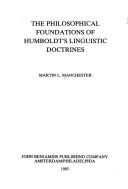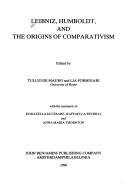| Listing 1 - 7 of 7 |
Sort by
|
Book
ISBN: 3869450282 9783869450285 9783883092003 3883092002 Year: 2005 Publisher: Nordhausen
Abstract | Keywords | Export | Availability | Bookmark
 Loading...
Loading...Choose an application
- Reference Manager
- EndNote
- RefWorks (Direct export to RefWorks)
Education --- Intercultural communication. --- Cross-cultural communication --- Communication --- Culture --- Cross-cultural orientation --- Cultural competence --- Multilingual communication --- Technical assistance --- Philosophy. --- Anthropological aspects --- Humboldt, Wilhelm, --- Humboldt, Guillaume, --- Humboldt, Charles Guillaume, --- Humboldt, Friedrich Wilhelm Christian Karl Ferdinand, --- Humboldt, Guillermo de, --- De Humboldt, Guillermo, --- Von Humboldt, Wilhelm, --- De Humboldt, Guillaume, --- De Humboldt, Charles Guillaume, --- Von Humboldt, Friedrich Wilhelm Christian Karl Ferdinand, --- Von Humboldt, Guillermo, --- Humbolts, V., --- Humboldt, G. de --- Gumbolʹdt, V., --- Gumbolʹdt, Vilʹgelʹm fon, --- Humboldt, Wilhelm von
Book
ISBN: 9004271945 9789004271944 1322223645 9781322223643 9789004271920 9004271929 Year: 2014 Publisher: Leiden
Abstract | Keywords | Export | Availability | Bookmark
 Loading...
Loading...Choose an application
- Reference Manager
- EndNote
- RefWorks (Direct export to RefWorks)
In The Humboldtian Tradition , eleven scholars consider Wilhelm von Humboldt as a historical phenomenon and a contemporary symbol. Inspired by the growing body of literature that in recent years has problematized the modern research university, they put Humboldt’s basic academic principles into context and discuss their significance for the current debate about higher education. The authors draw on the latest research in order to bring the educational and research policies of our day into perspective. At a time when the university is undergoing deep-seated transformations worldwide, they address the question how we should relate to the ideas associated with Humboldt’s name. What is his relevance to the twenty-first century? Contributors are: Mitchell Ash, Pieter Dhondt, Ylva Hasselberg, Marja Jalava, Peter Josephson, Thomas Karlsohn, Claudia Lindén, Johan Östling, Sharon Rider, Hans Ruin, Susan Wright.
Universities and colleges --- Education, Higher --- Colleges --- Degree-granting institutions --- Higher education institutions --- Higher education providers --- Institutions of higher education --- Postsecondary institutions --- Public institutions --- Schools --- Philosophy. --- Aims and objectives. --- Humboldt, Wilhelm, --- Humboldt, Guillaume, --- Humboldt, Charles Guillaume, --- Humboldt, Friedrich Wilhelm Christian Karl Ferdinand, --- Humboldt, Guillermo de, --- De Humboldt, Guillermo, --- Von Humboldt, Wilhelm, --- De Humboldt, Guillaume, --- De Humboldt, Charles Guillaume, --- Von Humboldt, Friedrich Wilhelm Christian Karl Ferdinand, --- Von Humboldt, Guillermo, --- Humbolts, V., --- Humboldt, G. de --- Gumbolʹdt, V., --- Gumbolʹdt, Vilʹgelʹm fon, --- Influence. --- Humboldt, Wilhelm von
Book
ISBN: 3830528663 9783830528661 Year: 2013 Publisher: Berlin BWV Berliner Wissenschafts-Verlag
Abstract | Keywords | Export | Availability | Bookmark
 Loading...
Loading...Choose an application
- Reference Manager
- EndNote
- RefWorks (Direct export to RefWorks)
Hauptbeschreibung This Report documents the statements given and debates held during the international conference Humboldt's Model: The Future of Universities in the World of Research which was organized as one of the concluding highlights in the bicentenary celebrations of Humboldt-Universität zu Berlin. Five panels of experts from all over the world discussed questions such as 'Do researchers need universities?', 'How to teach in a university?', 'Do we still need universities?', 'How to run and organize a university?' and 'Themes or Disciplines: What constitutes the perfect research environm
Universities and colleges --- Colleges --- Degree-granting institutions --- Higher education institutions --- Higher education providers --- Institutions of higher education --- Postsecondary institutions --- Public institutions --- Schools --- Education, Higher --- Research --- Humboldt, Wilhelm, --- Humboldt, Guillaume, --- Humboldt, Charles Guillaume, --- Humboldt, Friedrich Wilhelm Christian Karl Ferdinand, --- Humboldt, Guillermo de, --- De Humboldt, Guillermo, --- Von Humboldt, Wilhelm, --- De Humboldt, Guillaume, --- De Humboldt, Charles Guillaume, --- Von Humboldt, Friedrich Wilhelm Christian Karl Ferdinand, --- Von Humboldt, Guillermo, --- Humbolts, V., --- Humboldt, G. de --- Gumbolʹdt, V., --- Gumbolʹdt, Vilʹgelʹm fon, --- Humboldt, Wilhelm von
Book
ISBN: 9782847881097 2847881093 2847887369 Year: 2007 Publisher: Lyon: École normale supérieure,
Abstract | Keywords | Export | Availability | Bookmark
 Loading...
Loading...Choose an application
- Reference Manager
- EndNote
- RefWorks (Direct export to RefWorks)
La locution vision du monde est aujourd'hui très régulièrement utilisée dans la presse écrite et dans les sciences humaines, mais sait-on que c'est au linguiste allemand, Wilhelm von Humboldt (1767 - 1835), que nous devons le concept de Weltansicht traduit en français par vision du monde ? Ce concept fondamental de la théorie linguistique humboldtienne désigne une perception du monde organisée par une langue particulière. Il permet à Humboldt d'élaborer une définition innovante du langage fondée sur la prise en compte de la diversité des langues, en intégrant d'une part le rapport avec la pensée et le monde extralinguistique et, d'autre part, le lien avec une communauté humaine. Le présent ouvrage a pour ambition de faire connaître ce concept, enraciné dans les problématiques anthropologique et linguistique de la fin du xviiie siècle et du début du xixe, sa place dans la théorie du langage humboldtienne, sa portée dans la linguistique contemporaine et sa force d'actualité.
Philosophy of language --- Humboldt, von, Wilhelm --- Linguistics --- Language and languages --- Linguistique --- Langage et langues --- History --- Philosophy --- Histoire --- Philosophie --- Humboldt, Wilhelm, --- Criticism and interpretation --- Philosophy. --- Criticism and interpretation. --- Humboldt, Wilhelm von, --- Humboldt, Wilhelm von --- Humboldt, Guillaume, --- Humboldt, Charles Guillaume, --- Humboldt, Friedrich Wilhelm Christian Karl Ferdinand, --- Humboldt, Guillermo de, --- De Humboldt, Guillermo, --- Von Humboldt, Wilhelm, --- De Humboldt, Guillaume, --- De Humboldt, Charles Guillaume, --- Von Humboldt, Friedrich Wilhelm Christian Karl Ferdinand, --- Von Humboldt, Guillermo, --- Humbolts, V., --- Humboldt, G. de --- Gumbolʹdt, V., --- Gumbolʹdt, Vilʹgelʹm fon, --- Language and languages - Philosophy --- Humboldt, Wilhelm, - Freiherr von, - 1767-1835 - Criticism and interpretation --- langues --- vision --- XVIIIe siècle --- Humboldt (Wilhelm von) --- langage --- linguistique --- XIXe siècle --- Humboldt, Wilhelm, - Freiherr von, - 1767-1835

ISBN: 9027245142 9786613314024 1283314029 9027279519 9789027279514 9789027245144 9781283314022 6613314021 Year: 1985 Volume: 32 Publisher: Amsterdam
Abstract | Keywords | Export | Availability | Bookmark
 Loading...
Loading...Choose an application
- Reference Manager
- EndNote
- RefWorks (Direct export to RefWorks)
Wilhelm von Humboldt's writings on language are a mixture of philosophical theorizing about mind and language on the one hand, and on the other hand, specialized studies of the most detailed sort of both the classical languages and languages which only in Humboldt's day were becoming known to European scholars, such as Sanskrit, Chinese, and native north and south American languages. This book endeavors to show that Humboldt's work on language is a coherent system of thought; to recapture and expose the systematic structure of assumption, hypothesis, argument and conclusion; and to assign many
Philosophy of language --- Humboldt, von, Wilhelm --- Linguistics --- -Linguistic science --- Science of language --- Language and languages --- History --- -Humboldt, Wilhelm Freiherr von --- -Contributions in metaphysics --- Linguistique --- Histoire --- Humboldt, Wilhelm von, --- Humboldt, Wilhelm, --- Contributions in linguistics. --- Et la linguistique --- Humboldt, Guillaume, --- Humboldt, Charles Guillaume, --- Humboldt, Friedrich Wilhelm Christian Karl Ferdinand, --- Humboldt, Guillermo de, --- De Humboldt, Guillermo, --- Von Humboldt, Wilhelm, --- De Humboldt, Guillaume, --- De Humboldt, Charles Guillaume, --- Von Humboldt, Friedrich Wilhelm Christian Karl Ferdinand, --- Von Humboldt, Guillermo, --- Humbolts, V., --- Humboldt, G. de --- Gumbolʹdt, V., --- Gumbolʹdt, Vilʹgelʹm fon, --- Humboldt, Wilhelm von

ISBN: 9027245320 9789027245328 9786613720986 128087967X 9027278121 9789027278128 9781280879678 6613720984 Year: 1989 Volume: 49 Publisher: Amsterdam Philadelphia Benjamins
Abstract | Keywords | Export | Availability | Bookmark
 Loading...
Loading...Choose an application
- Reference Manager
- EndNote
- RefWorks (Direct export to RefWorks)
Both Leibniz and Humboldt are scholars in whose work we find a passionate interest in the history and development of languages combined with a strong theoretical commitment. Linking their names to linguistic comparativism draws attention to the contribution these scholars have made to the history of comparativism and also promotes discussion of the relationship of theory and practice in linguistic research in more general terms. In September 1986, a conference on Leibniz, Humboldt and the Origins of Comparativism' was held in Rome. The papers included in this volume are revised versions of the actual presentations.
Humboldt, von, Wilhelm --- -Comparative philology --- Humboldt, Wilhelm von, --- Humboldt, Guillaume, --- Humboldt, Charles Guillaume, --- Humboldt, Friedrich Wilhelm Christian Karl Ferdinand, --- Humboldt, Guillermo de, --- De Humboldt, Guillermo, --- Von Humboldt, Wilhelm, --- De Humboldt, Guillaume, --- De Humboldt, Charles Guillaume, --- Von Humboldt, Friedrich Wilhelm Christian Karl Ferdinand, --- Von Humboldt, Guillermo, --- Humbolts, V., --- Humboldt, G. de --- Gumbolʹdt, V., --- Gumbolʹdt, Vilʹgelʹm fon, --- Linguistique comparée --- Contributions in linguistics --- Et la linguistique --- Comparative linguistics --- Philology, Comparative --- History --- -Congresses --- Leibniz, Gottfried Wilhelm, --- Leibnitz, Gottfried Wilhelm --- Leibniz, Gottfried Wilhelm --- Conferences - Meetings --- Comparative philology --- Historical linguistics --- Humboldt, Wilhelm, --- Leibniz, von, Gottfried W. --- Congresses --- Histoire --- Congrès --- Congresses. --- Humboldt, Wilhelm, Freiherr von --- Comparative linguistics - History - Congresses. --- Leibniz, Gottfried Wilhelm, Freiherr von, 1646-1716 - Contributions in linguistics - Congresses. --- Humboldt, Wilhelm, Freiherr von, 1767-1835 - Congresses. --- Humboldt, Wilhelm von
Multi
ISBN: 0748671803 1282136615 9786612136610 0748640223 9780748640225 9780748638420 0748638423 6612136618 Year: 2012 Publisher: Edinburgh Edinburgh University Press
Abstract | Keywords | Export | Availability | Bookmark
 Loading...
Loading...Choose an application
- Reference Manager
- EndNote
- RefWorks (Direct export to RefWorks)
This is a short academic introduction to the work of the German 19th-century philologist Wilhelm von Humboldt and with theories loosely referred to in connection with the Whorf-Sapir hypothesis.
Language and languages --- Philosophy. --- Humboldt, Wilhelm, --- Humboldt, Guillaume, --- Humboldt, Charles Guillaume, --- Humboldt, Friedrich Wilhelm Christian Karl Ferdinand, --- Humboldt, Guillermo de, --- De Humboldt, Guillermo, --- Von Humboldt, Wilhelm, --- De Humboldt, Guillaume, --- De Humboldt, Charles Guillaume, --- Von Humboldt, Friedrich Wilhelm Christian Karl Ferdinand, --- Von Humboldt, Guillermo, --- Humbolts, V., --- Humboldt, G. de --- Gumbolʹdt, V., --- Gumbolʹdt, Vilʹgelʹm fon, --- Philosophers --- Humboldt, Wilhelm von, --- Humboldt, Wilhelm von --- Humboldt, von, Wilhelm --- Llenguatge i llengües --- Filòsofs --- Alemanya --- Erudits --- Filòsofes --- Filòsofs antics --- Filòsofs moderns --- Presocràtics --- Socràtics --- Sofistes (Filosofia) --- Llengües --- Llengües i llenguatge --- Antropologia --- Filologia --- Comunicació escrita --- Conversa --- Elocució --- Escriptura --- Espai i temps en el llenguatge --- Lingüística --- Llengua d'ensenyament --- Llengua materna --- Llenguatge de les flors --- Llenguatge de signes --- Llenguatge infantil --- Llengües indígenes d'Amèrica --- Llengües modernes --- Multilingüisme --- Oratòria --- Sociolingüística --- Traducció --- Veu --- Comunicació --- Didàctica de la llengua --- Gramàtica --- Llenguatge a Internet --- Origen del llenguatge --- Gumbol'dt, V., --- Gumbol'dt, Vil'gel'm fon, --- Humboldt, G. de, --- Humboldt, Wilhem, --- De Humboldt, Guillermo von, --- Bundesrepublik Deutschland --- Deutschland --- Europa occidental --- Països de la Unió Europea --- Països de parla alemanya --- Baden-Württemberg (Alemanya) --- Baixa Saxònia (Alemanya) --- Baviera (Alemanya) --- Berlín (Alemanya) --- Brandenburg (Alemanya) --- Bremen (Alemanya) --- Hamburg (Alemanya) --- Hessen (Alemanya) --- Rin del Nord-Westfàlia (Alemanya) --- Saarland (Alemanya) --- Alemanya (República Democràtica) --- Alemanya (República Federal) --- Germània --- Sacre Imperi Romanogermànic
| Listing 1 - 7 of 7 |
Sort by
|

 Search
Search Feedback
Feedback About UniCat
About UniCat  Help
Help News
News